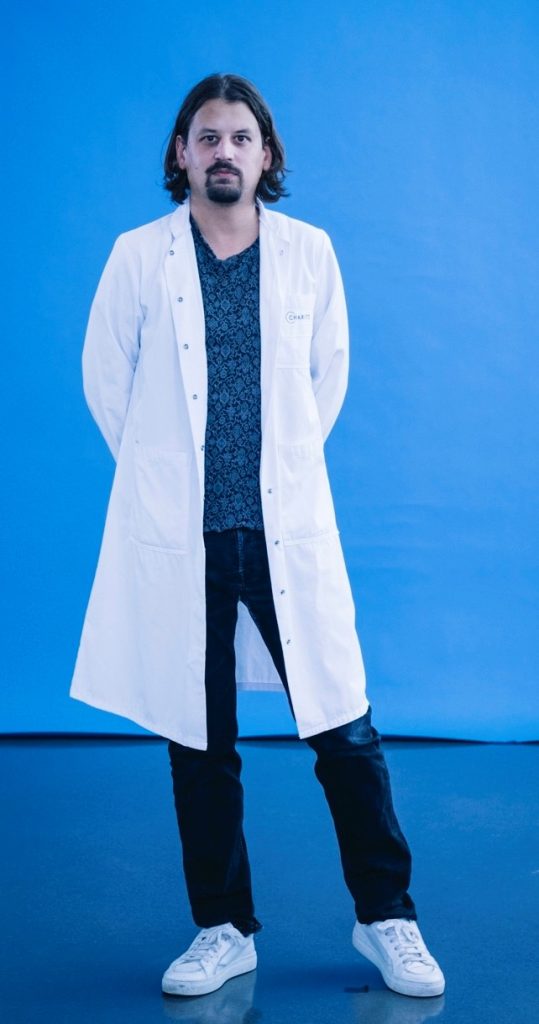“Simple Minds”: ERC Consolidator Grant for Charité neuroscientists

Berlin, 31 January 2023
If we are hungry, we should stay awake and eat. If we are tired, we should sleep and not eat. It is obvious: The behavioural programmes for eating and sleeping are mutually exclusive. But how does the brain determine which programme is the right one at any given moment? At the Charité – Universitätsmedizin Berlin, neurophysiologist and behavioural scientist Prof. Dr. David Owald is now investigating this question in detail, using the tiny brain of the fruit fly as an example. The “Simple Minds” project will be funded for the next five years with around two and a half million euros through an ERC Consolidator Grant.
What makes us make decisions? How are we controlled? And how do we decide which behaviour is the most sensible at a given moment? Centuries-old questions that researchers are always trying to answer anew. “Still little is known about how exactly networks of nerve cells and filter mechanisms in the brain contribute to certain patterns of behaviour,” says Prof. Owald. “We are particularly interested in the connections between activity patterns, memory traces and neuronal filters, such as those underlying vital needs. The goal is to better understand the physiological basis of these processes, because they could provide access to our decision-making bases, but also to diseases such as depression.”

Prof. Dr. David Owald works with an international interdisciplinary team at the Institute of Neurophysiology at Charité and is a member of the NeuroCure Cluster of Excellence. Even during his doctorate, he was interested in molecular influences that can change the strength of connections between nerve cells. Later, among other things, he researched in Oxford how reward memories are stored in the brains of fruit flies. Today, the neurobiologist’s research focuses on the fundamentals of learning processes, addictive behaviour and memory changes, as well as the neuronal control of motivation. The ERC Consolidator Grant now awarded follows an Emmy Noether Junior Research Group, funded by the German Research Foundation.
Simple Minds: The fruit fly as a model
The fruit fly Drosophila melanogaster, widely known as the fruit fly, has very basic needs. And with about 200,000 nerve cells, it has a fairly manageable brain. Some of the behaviours that can be observed in this little fly, and the associated processes in the brain, can be transferred to humans in a slightly modified form. Genetic techniques, which have recently been strongly developed worldwide, can be used to specifically observe the activity of individual nerve cells or even the activity of nerve cell networks and to measure various forms of control – from molecules to entire network ensembles.
“Based on our preliminary work, we are pursuing the hypothesis in the ‘Simple Minds’ project that sensory information is specifically filtered to enable behaviour such as sleep or falling asleep and staying asleep. The basis for this is rhythmic network activity and changes in the connection strength of nerve cells. We want to observe exactly how this happens in the fruit fly’s brain,” explains Prof. Owald. And what happens when the animal cannot achieve what the brain tells it to do? When, like Sisyphus, it fails to reach its goal despite exerted effort? The neuroscientist suspects that such a state can lead to a feeling of helplessness, similar to what patients with depression sometimes experience.
ERC Consolidator Grant
The ERC Consolidator Grant supports excellent scientists who want to conduct groundbreaking research in Europe as research or project leaders (Principal Investigators) in consolidating their own independent research group. Consolidator Grant calls are aimed at researchers who have completed their doctorate between seven and twelve years ago. The grant is awarded by the European Research Council (ERC) in the Horizon Europe framework programme. The projects each have around two million euros at their disposal for a period of five years.
Links:
Institut für Neurophysiologie
ERC Grants an der Charité
Pressemitteilung des Europäischen Forschungsrates (ERC)
